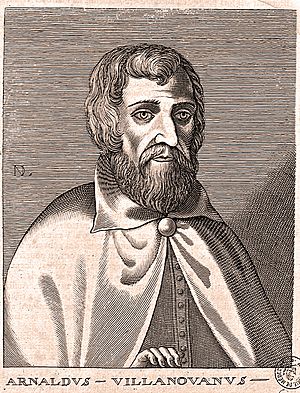Arnaldus de Villa Nova facts for kids
Quick facts for kids
Arnaldus de Villa Nova
|
|
|---|---|
 |
|
| Born | c.1240 unknown
|
| Died | c.1311 |
| Region | Mediterranean |
Arnaldus de Villa Nova (also known as Arnau de Vilanova in Catalan) was a very important person from the Middle Ages. He lived from about 1240 to 1311. He was a skilled physician (doctor) and also a religious thinker who wanted to make changes in the church.
Many people believed he was an alchemist, someone who tried to turn ordinary metals into gold. His house even had carvings of alchemical symbols, like a lion and a dragon biting its tail. He was also known as an astrologer, someone who studied how stars and planets might affect human events.
Arnaldus was born in the Crown of Aragon, which is now part of Spain. He likely came from Villanueva de Jiloca or Valencia. He studied medicine and theology (the study of religious beliefs). He worked for the King of Aragon and taught at the famous Montpellier School of Medicine in France.
Later, he moved to Paris and became very well-known. However, some church leaders didn't like his ideas. In 1311, Pope Clement V asked him to come to Avignon. Sadly, Arnaldus died during the sea journey near Genoa.
He helped translate many important medical books from Arabic into Latin. These included works by famous doctors like Ibn Sina and Galen. Many books about alchemy were also thought to be written by him, but most of them were not truly his work. He also wrote important medical books and many religious writings, some of which included prophecies about the future.
Life and Work of Arnaldus
Arnaldus de Villa Nova's exact birthplace and birth year are still debated by historians. Some think he was born near Montpellier, while others believe it was in Aragon or Valencia in Spain. What we do know is that he was very famous in Catalonia, Valencia, and the Balearic Islands as "Arnau de Vilanova." He wrote many of his works in the Valencian dialect of Catalan. He was highly respected as a doctor, religious thinker, and alchemist.
He studied medicine in Montpellier until about 1260. He traveled a lot through France, Catalonia, and Italy, working as both a doctor and an ambassador. From 1281, he was the personal doctor to the King of Aragon. After King Peter III of Aragon died in 1285, Arnaldus left Barcelona and went back to Montpellier.
Arnaldus was influenced by a thinker named Joachim of Fiore. Arnaldus believed that the world would end in 1378 and that the Antichrist would appear. Because of these ideas about church reform, the University of Paris accused him of heresy (beliefs against official church teachings) in 1299. He was even put in prison. Luckily, Boniface VIII, a pope whom Arnaldus had cured of a serious illness, helped him get out. He was imprisoned again around 1304. The Sorbonne even ordered some of his philosophical writings to be burned.
Between 1291 and 1299, he was the head of the medical school. His reputation as a doctor was huge! He treated three popes and three kings. He was also one of the first doctors to use alcohol as an antiseptic, which helps prevent infections.
He became an ambassador for James II, the king of Aragon and Sicily. To escape the Inquisition (a church court that investigated heresy), he found safety at the court of Frederick III in Sicily. Later, Pope Clement V called him to Avignon to be his doctor. Arnaldus likely influenced a special rule in 1309 that said medical students needed to know about many ancient Greek and Arabic medical texts.
He died in a shipwreck near Genoa in 1311 while on a diplomatic trip. After his death, a church official in Tarragona condemned him, and fifteen of his ideas were officially criticized.
Images for kids
See also
 In Spanish: Arnau de Vilanova para niños
In Spanish: Arnau de Vilanova para niños
- Brazen Head
- Latin translations of the 12th century
- Litmus
 | Ernest Everett Just |
 | Mary Jackson |
 | Emmett Chappelle |
 | Marie Maynard Daly |



